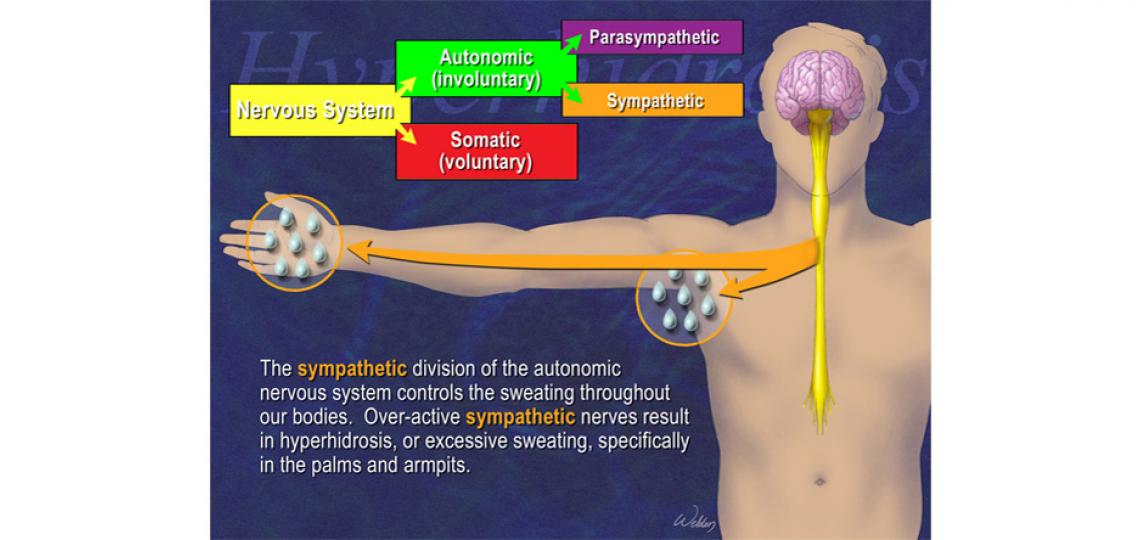How to Stop Sweaty Hands and Feet: Top Dermatology Treatments for Excessive Sweating
How to Stop Sweaty Hands and Feet: Top Dermatology Treatments for Excessive Sweating
Blog Article
Comprehending the Origin of Excessive Sweating and Its Effect on Day-to-day Live
Excessive sweating, additionally referred to as hyperhidrosis, is a problem that influences a significant part of the populace, yet its hidden causes and implications on day-to-day functioning stay rather enigmatic. While it is commonly understood as a physiological action to manage body temperature, the triggers for excessive sweating can differ widely among individuals, including not just physical variables but also emotional and emotional elements. The effect of this condition prolongs beyond plain pain, often influencing social communications and total top quality of life. By diving right into the origin creates of hyperhidrosis and exploring its diverse impacts, a deeper understanding of this pervasive issue can be gained, clarifying the complexities that people facing excessive sweating navigate daily.
Physiology of Sweat Glands
The guideline of sweat production, an important physical procedure, is largely managed by the task of gland distributed throughout the body. Sweat glands are classified right into 2 major kinds: eccrine and apocrine glands. Eccrine glands are the most numerous and are discovered in mostly all locations of the body. They play a crucial role in thermoregulation by producing a watery fluid onto the skin's surface, which aids and evaporates cool down the body down. In contrast, apocrine glands are focused in locations rich in hair roots, such as the armpits and groin, and their secretions are thicker and milklike in appearance.
When the body temperature level rises, either as a result of physical task, high temperature levels, or psychological tension, the nerves activates the sweat glands to create sweat. This sweat is made up mainly of water and electrolytes like salt and chloride. The process of sweat manufacturing is important for keeping the body's inner temperature within a slim, optimal range, highlighting the important role gland play in human physiology.
Triggers for Excessive Sweating
In understanding the source of excessive sweating, it is critical to determine the triggers that can lead to this physical reaction. Extreme sweating, also called hyperhidrosis, can be triggered by different variables, both physiological and environmental. One usual trigger is emotional stress or anxiousness, which can stimulate the body's gland to produce more sweat than is essential for cooling down. Physical effort, high temperatures, and spicy foods are additionally recognized to cause excessive sweating in individuals susceptible to this condition. Certain clinical problems like menopause, hyperthyroidism, or diabetic issues can add to too much sweating as well.
Furthermore, drugs such as some antidepressants, opioids, and specific supplements can additionally work as triggers for hyperhidrosis. Understanding these triggers is vital in handling extreme sweating effectively - Exessive Sweating. By determining and addressing the certain triggers that trigger excessive sweating in a private, Full Article doctor can develop individualized treatment strategies to reduce this condition and boost the person's high quality of life
Medical Conditions Associated
Related to too much sweating are numerous medical problems that can intensify this physical reaction. One usual problem is hyperhidrosis, a disorder characterized by unusually enhanced sweating that surpasses the body's thermoregulatory requirements. This can show up in focal locations like the palms, soles, underarms, or face, affecting a person's lifestyle because of social embarrassment and pain.
Additionally, endocrine disorders such as hyperthyroidism, diabetes mellitus, and menopausal warm flashes can likewise lead to extreme sweating. Hyperthyroidism triggers an overproduction of thyroid hormonal agents, speeding up metabolic rate and triggering sweating.
Moreover, infections like endocarditis, consumption, and hiv have actually been connected with evening sweats, an usual symptom understood to disrupt rest and influence general wellness. These clinical conditions highlight the varied array of underlying variables that can contribute to extreme sweating, necessitating thorough analysis and management by health care experts.
Psychological and Mental Variables

Effect On Social Communications
Too much sweating can have profound results on an individual's capability to engage conveniently in social interactions. The noticeable indicators of sweat stains or wet spots on apparel can result in shame and self-consciousness, triggering people to take out from social situations. This withdrawal can affect partnerships, limit social tasks, and hinder specialist and individual development.

In addition, the anxiousness and self-esteem problems coming from too much sweating can impact interaction and interpersonal abilities. Individuals may struggle to concentrate on discussions, take part visit this website in team tasks, or share themselves with confidence. This can cause feelings of isolation and isolation, as social links end up being challenging to preserve.
Final Thought

While it is generally understood as a physical response to control body temperature, the triggers for too much sweating can vary extensively amongst people, encompassing not only physical factors yet mental and likewise psychological aspects. By delving into the origin triggers of hyperhidrosis and exploring its complex results, a deeper understanding of this prevalent issue can be gained, losing light on the complexities that individuals grappling with too much sweating navigate on a daily basis.
Physical exertion, high temperature levels, and spicy foods are likewise understood to trigger too much sweating in individuals prone to this problem. By determining and addressing the certain triggers that prompt excessive sweating in a private, healthcare carriers can establish customized treatment plans to reduce this problem and improve the person's top quality of life.
Too much sweating can have extensive effects on a person's ability to engage conveniently in social communications.
Report this page